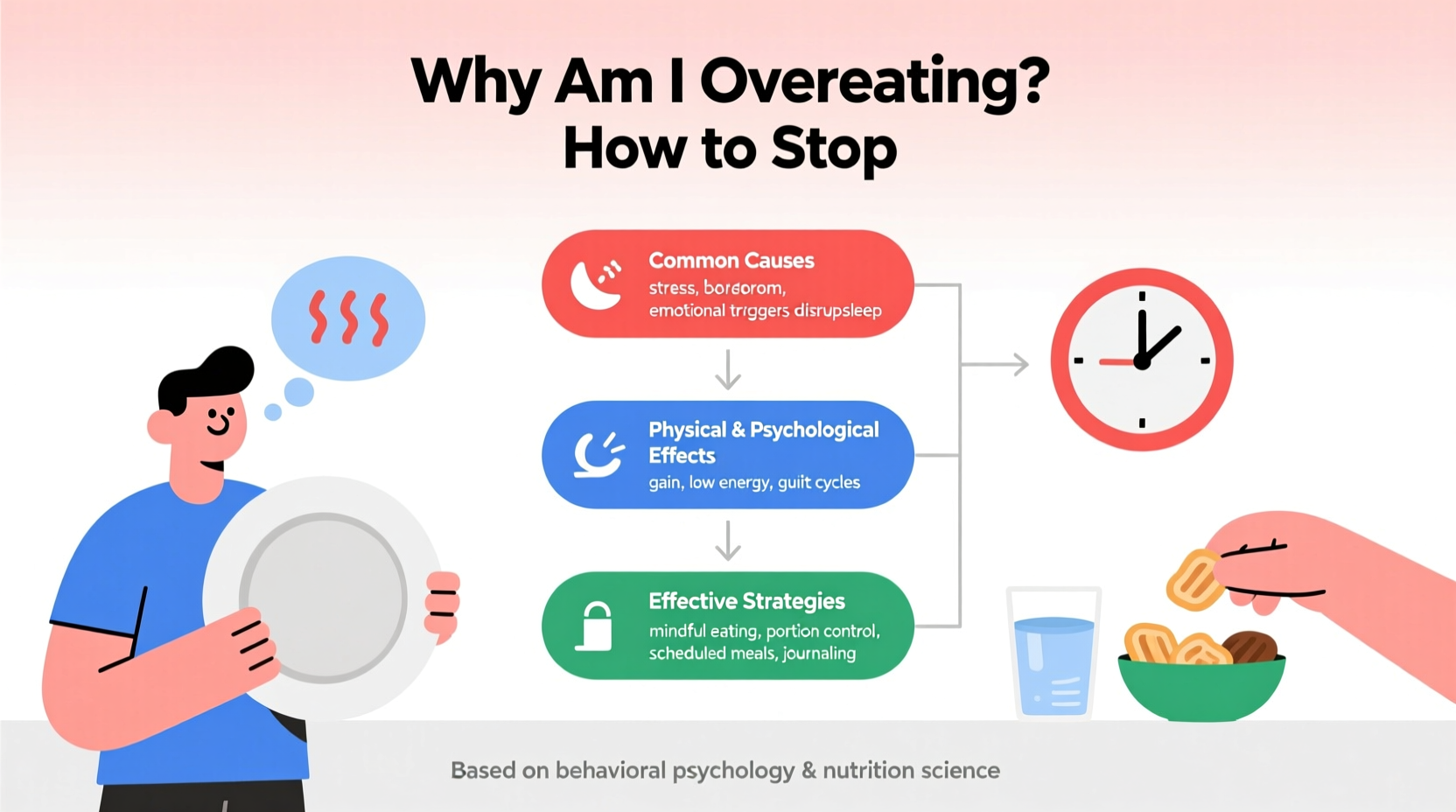Overeating is more than just a lack of willpower. It’s a complex behavior rooted in biology, psychology, environment, and daily habits. Millions struggle with eating past fullness, not because they want to, but because unseen forces drive them to do so. Understanding why you're overeating is the first step toward lasting change. This article breaks down the core causes of overeating and offers practical, science-backed solutions to help you regain control—without guilt or extreme diets.
The Hidden Triggers Behind Overeating

Most people assume overeating stems from poor discipline. In reality, it's often driven by deeper factors that have little to do with food itself. These include emotional states, disrupted hunger signals, environmental cues, and lifestyle imbalances.
One major contributor is **emotional eating**. Stress, loneliness, boredom, or even happiness can trigger cravings unrelated to physical hunger. When emotions aren’t processed healthily, food becomes a coping mechanism. Sugary, fatty foods activate dopamine pathways in the brain, offering temporary relief—but reinforcing a cycle of overconsumption.
Another overlooked factor is **sleep deprivation**. Research shows that people who sleep less than six hours per night experience increased levels of ghrelin (the hunger hormone) and decreased leptin (the satiety hormone). This hormonal imbalance leads to stronger cravings, especially for high-calorie, low-nutrient foods.
Common Physical and Psychological Causes
- Dieting history: Chronic restriction trains the body to overeat when food becomes available, as a survival response.
- Dehydration: Thirst is often mistaken for hunger, leading to unnecessary snacking.
- Lack of protein/fiber: Meals low in these nutrients don’t sustain fullness, causing frequent hunger.
- Fast eating: It takes about 20 minutes for the brain to register fullness. Eating quickly bypasses this signal.
- Environmental cues: Large plates, constant food availability, and advertising subconsciously encourage more consumption.
- Mental health conditions: Depression, anxiety, and trauma are strongly linked to compulsive eating behaviors.
“Overeating isn't a moral failure—it's often the body responding to years of restriction, stress, or unmet emotional needs.” — Dr. Rebecca Klein, Clinical Psychologist & Eating Behavior Specialist
How to Stop Overeating: A Step-by-Step Guide
Breaking free from overeating requires a structured approach focused on awareness, habit change, and self-compassion. Follow these steps to build sustainable control:
- Identify your personal triggers. Use a food and mood log to track when and why you eat beyond hunger.
- Practice mindful eating. Eliminate distractions, chew slowly, and pause midway through meals to assess fullness.
- Eat balanced meals. Include protein, healthy fats, fiber, and complex carbs to maintain stable blood sugar.
- Establish regular meal times. Skipping meals increases the risk of later binging due to intense hunger.
- Improve sleep hygiene. Aim for 7–9 hours nightly to regulate appetite hormones naturally.
- Replace emotional coping with alternatives. Try walking, journaling, calling a friend, or breathing exercises instead of reaching for food.
- Reframe your mindset. Focus on nourishment and energy rather than punishment or restriction.
Do’s and Don’ts of Managing Overeating
| Do | Don’t |
|---|---|
| Eat regular, balanced meals every 3–4 hours | Skip meals to “save calories” for later |
| Drink a glass of water before snacks to check thirst | Eat straight from the package while distracted |
| Use smaller plates and bowls to manage portions | Label foods as “good” or “bad”—this creates guilt and rebound eating |
| Pause for 5 minutes before second servings | Engage in strict dieting, which increases binge risk |
| Seek support if emotional eating persists | Ignore persistent feelings of shame or loss of control around food |
A Real-Life Example: Breaking the Cycle
Sarah, a 34-year-old project manager, found herself eating large amounts of snacks late at night—even when not hungry. She felt out of control and ashamed. After tracking her habits, she realized her evenings were emotionally empty: after putting the kids to bed and finishing work, she had no downtime. Snacking became her only form of relaxation.
With guidance, Sarah introduced small changes: a cup of herbal tea while reading, a 10-minute evening walk, and setting a cutoff time for work emails. Within three weeks, her nighttime eating dropped significantly. The turning point wasn’t willpower—it was replacing the emotional void with healthier rituals.
Essential Checklist to Reduce Overeating
Use this checklist daily or weekly to stay on track:
- ✅ Did I eat enough protein and fiber at my last meal?
- ✅ Have I drunk water today? (Aim for at least 6–8 glasses)
- ✅ Am I eating due to hunger, or because of stress/boredom?
- ✅ Is my plate balanced (¼ protein, ¼ grains, ½ vegetables)?
- ✅ Did I eat slowly and without screens?
- ✅ Have I moved my body today, even briefly?
- ✅ Did I get at least 7 hours of sleep last night?
Frequently Asked Questions
Why do I keep eating even when I'm full?
This often happens due to a disconnect between physical fullness and emotional satisfaction. If food is used to soothe stress or fill time, the brain doesn’t register completion. Additionally, hyper-palatable foods (high in sugar, fat, salt) override natural satiety signals, making it easier to overconsume.
Is overeating a sign of an eating disorder?
Occasional overeating—like during holidays—is normal. But if you frequently consume large amounts of food while feeling out of control, and experience shame or distress afterward, it may indicate binge eating disorder (BED). BED affects 2.8% of adults and is treatable with therapy and nutritional counseling.
Can medication help with overeating?
In some cases, yes. FDA-approved medications like lisdexamfetamine (Vyvanse) are used for moderate to severe binge eating disorder. However, behavioral therapy—especially cognitive behavioral therapy (CBT)—is considered the gold standard for long-term recovery.
Conclusion: Regain Control With Compassion
Overeating is not a life sentence. It’s a signal—one that points to unmet needs, whether physiological, emotional, or environmental. Lasting change doesn’t come from stricter rules or willpower, but from understanding, consistency, and kindness toward yourself.
You don’t need perfection. You need awareness, small adjustments, and the courage to address what’s really driving your eating habits. Start with one step: identify your most common trigger, then choose one strategy to disrupt it. Progress compounds. Every mindful bite is a move toward freedom.









 浙公网安备
33010002000092号
浙公网安备
33010002000092号 浙B2-20120091-4
浙B2-20120091-4
Comments
No comments yet. Why don't you start the discussion?